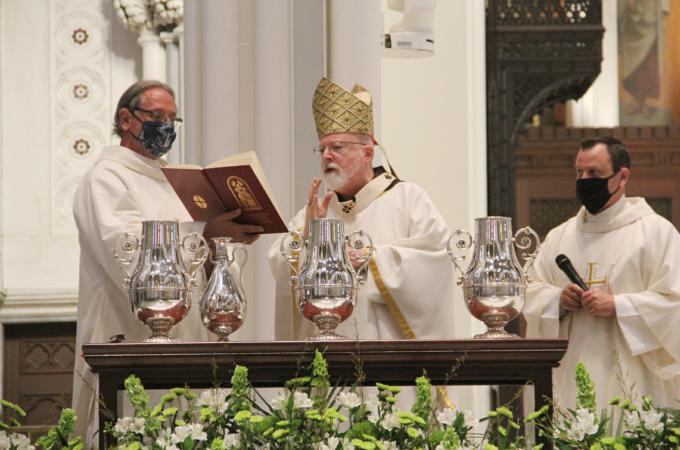Chrism Mass celebrates unity of priesthood, sacraments
BOSTON -- Under normal circumstances, the Chrism Mass typically takes place on Holy Thursday, the day Jesus ordained his apostles as the first priests. This year, however, the archdiocese's Chrism Mass was postponed for almost four months in light of state restrictions to prevent the spread of the COVID-19 virus. The event took place instead on Aug. 4 at the Cathedral of the Holy Cross.
The Chrism Mass is seen as a celebration of priestly fraternity, when priests gather to renew their vows and receive the sacred oils to be used in the following year for the sacraments of baptism, confirmation, and priestly ordination. This year, only a limited number of priests were invited to the event, and the oils were to be distributed later to those who could not attend. The service was televised so that the absent priests could watch from their homes.
Among those present for the Mass were priests who had been ordained a few days earlier on Aug. 1, as well as members of the COVID-19 priest response team, which was organized to safely administer the Sacrament of the Sick to COVID-19 patients.
Addressing the priests in his homily, Cardinal Seán P. O'Malley said he wanted to "acknowledge all the sacrifices that you make to serve God's people."
"Our Chrism Mass is a moment when we gather in gratitude for our vocation and the many graces bestowed upon us," he said.
He shared some reflections on the priorities of the apostles that led them to ordain the first permanent deacons. The apostles, he said, "wanted help so as to be able to dedicate more time to prayer and preaching."
Cardinal O'Malley spoke about the example of Bishop Fulton Sheen, whom he met during the bishop's visits to his parish when he was an altar server. According to Bishop Sheen's autobiography "Treasure in Clay," upon his ordination he resolved to spend an hour every day in Eucharistic Adoration.
"I am convinced the power of his preaching was not his eloquence or wit or great culture, but rather was born of those hours he spent in prayer before our Eucharistic Lord," Cardinal O'Malley said.
He pointed out that immediately after the apostles' ordination on Holy Thursday, Jesus invited them to watch and pray with him.
"Jesus does not ask for an hour of activity but pleaded for an hour of companionship," Cardinal O'Malley said.
He encouraged the priests of the archdiocese to commit to making a Eucharistic Holy Hour.
"Today, I reiterate Jesus' invitation, 'Could you not watch one hour with me?'" he said.
After the homily, the priests renewed their priestly promises, and the names of those who had died over the past year were read aloud and prayers offered for them.
Then, the cardinal blessed the oil of catechumens, the oil of the infirm, and the sacred chrism, which is used for baptism and priestly ordination.
Father Michael Zimmerman, the archdiocese's assistant vocation director, served on the COVID-19 response team and was present at the Mass. In an Aug. 3 interview, he said that the oils and the sacraments unite the faithful with Christ and with each other, and that the Chrism Mass shows the priests' unity under their bishop.
The oils used for baptisms, confirmations, and priestly ordination in the archdiocese in the following year "come from this one celebration," Father Zimmerman said.
He said having the Chrism Mass on the feast day of St. John Vianney, patron saint of diocesan priests, was "a beautiful thing" to him.
Father Michael Sheehan, who also served on the COVID-19 response team, said that priests are most familiar with the oil of the sick, while the sacred chrism and the oil of catechumens seemed more special because they were used less often.
However, he said, in an email to The Pilot, "our whole lives were upended just because of this oil. I had to live in a different place, I had to learn a different way to apply the oil, I had to learn how to wear personal protective equipment. Prayers outside of the room without contact are important. But we did all that we could to make sure that we could at least apply a little bit of the oil, with a swab, on the ankle of the person ill with COVID-19. For the most part, the other two oils just stayed in the display case in the sanctuary of the church. But virtually my entire pastoral life changed because of the oil of the sick."
Father Sheehan said that through this experience, he "gained a new appreciation for this holy oil."



















